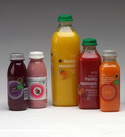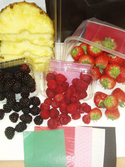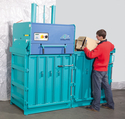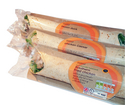Pushing the green
22 August 2008Packaging Today outlines some packaging concepts, techniques and materials with environmental credentials
According to a Nielsen Global Food Packaging Survey, nearly half of global consumers would give up all packaging used for convenience purposes if it would benefit the environment. On the other hand, the Nielsen survey found consumers were least willing to give up packaging designed to keep products clean and untouched by others (27 per cent); that intended to maintain good condition (30 per cent); information in the form of food labelling, cooking and usage instructions (33 per cent); and that which is used to preserve products and extend their life (34 per cent). Ten per cent of global consumers were not prepared to relinquish any aspect of packaging for the benefit of the environment.
The quest is thus afoot to develop materials and concepts that have environmental credentials, yet provide the required characteristics. The purpose of this article is to outline some recent initiatives that may be employed.
Corrugated - a green concept?
Most of those in the packaging industry are aware that corrugated can be recycled. Andrew Barnetson, Corrugated Sector Manager, Confederation of Paper Industries, claims that: “The recycling process is so efficient in the UK that fibres from one box can be reused in another within 14 days. The highly effective infrastructure of box-making, waste collection and recycling into paper determines that 84 per cent of all corrugated packaging is recycled. On average, 76 per cent of all fibre used in UK-manufactured boxes has already been recycled.”
In the cartonboard sector, there is a drift towards lightweighting. Board manufacturer M-real has thus launched the Lite4U concept, comprising a range of lightweight boards that it claims have properties akin to those of heavier grades. The company has strived to realise the same stiffness and thickness, yet states that its boards are now up to 44 per cent lighter than the standard equivalents. They are designed to achieve good runnability characteristics and be manufactured to tight tolerances. M-real also states that the runnability facilitates the die-cutting of up to 22 per cent more sheets per hour.
Recycling at the sharp end
According to the latest figures, 85 per cent of local authorities now provide collection facilities for paper-based cartons. This indicates that the beverage carton recycling scheme launched by Tetra Pak UK and the carton industry body Alliance for Beverage Cartons and the Environment (ACE UK) retains its popularity since its launch just over a year ago.
According to Tetra Pak, this announcement constitutes progress in boosting carton collection. Although cartons have been successfully recycled in large volumes across Europe for many years, collection facilities were very limited in the UK until the initiation of this scheme. Fay Dashper, National Recycling Operations Manager, Tetra Pak, stated: “There are millions of passionate recyclers in the UK. Here at Tetra Pak UK, we share their desire to see ever more materials recycled. We are committed to continue working with our industry partners to build on this success, working with local authorities to increase kerbside collection in as many areas as possible.” Tetra Pak has also launched an online pledge where consumers can reinforce their commitment to recycle.
Reprocessing PET
Earlier this year, Herbold Meckesheim commissioned a washing line for PET bottles in Kazakhstan. The line operator, Vtorma Ecology, has also built the country’s first big waste grading plant in Almaty. The positively-sorted PET bottles are transformed by the Herbold washing line into a high-quality ground material. These machines are designed to treat highly contaminated bottles from the waste grading plant, handling up to 8000 tonnes of material per year. The system initially involves debaling and pre-washing; additional sorting and metal separation; and wet size reduction together with wet washing.
This is followed by the first separation stage, comprising separation of polyolefines and PET flakes, followed by the hot washing step using ultra-filtrations to remove the glue from the washing water. The second separation stage involves hydroclone separation and drying, which involves reduction to the specified final granule size with a residual humidity of 1 per cent. This is followed by sorting of flakes to separate dust, fibres, paper and label rests. The end-product is a high-quality ground material that can be further treated and used for bottle-to-bottle applications or made into high-quality fibres and plastic strappings. A second washing line has been developed for PE film waste.
Lely Recycling Engineering is now distributing the full range of Austropressen balers to the UK, including downstroke baling presses. Lely reports that the models range in capacity from 1-30 tonnes/hr. The Austropressen range comprises vertical and horizontal balers, semi- and fully-automatic channel baling presses, can and barrel presses, fully-automatic can crushers, waste compactors, stationery balers, tipping devices, chain belt conveyors and reel splitting machinery.
The Lely recycling division was established in 2000 with the launch of the Welger range of RV waste roller and automatic industrial balers to the UK.
The company claims that its current range of Welger RV waste rollers is capable of baling plastic film, paper, board and textiles into 25–30kg cylindrical bales every four minutes, thereby reducing volume by a maximum ratio of 15 to 1.
Located in Dagenham, Essex, the world’s first food grade PET/HDPE plastic bottle recycling plant was opened on 27 June. In its first year, Closed Loop Recycling predicts it will reprocess 35,000 tonnes of plastic bottles, including milk and soft drink bottles. These are transformed into recycled raw material for new packaging. The first customers to purchase the recycled food grade plastic from the plant include Coca Cola Enterprises, Marks & Spencer, Nampak Plastics Europe and Solo Cup (Europe). Chris Dow, Managing Director, Closed Loop Recycling, commented: “Until now there has been no facility to recycle bottles back into plastic food packaging. The packaging industry and consumer are now viewing recycled plastic in a completely new light. It is no longer waste - it is a valuable resource.”
Designing for recycling
EskoArtwork has recently joined the Sustainable Packaging Coalition (SPC) and has stated that it is striving to provide integrated solutions, software and hardware that contribute to eco-friendly packaging design and production processes. It says it is aiming to develop more creative design methods, undertake careful materials selection, and evolve applications that focus on error avoidance and reduction. This should serve to minimise waste, reduce shipping costs and increase efficiencies, thereby creating more eco-friendly packaging alternatives.
EskoArtwork states that it is now designing to embrace the cradle-to-cradle concept, whereby packaging waste is transformed into ‘nutrients’. The waste safely breaks down into the soil after use (biological nutrients), or becomes raw materials that can be reused or completely recycled in a tight, closed-loop process for use in equally high-quality packages (technical nutrients). EskoArtwork considers that the central element of this concept is that designing for environmental sustainability can be profitable.
Recycled films - the way forward
DuPont Teijin Films manufactures polyester films for the food industry, particularly focusing on heat-seal films for ready-meals. The company has recently developed the Mylar rPET recycled heatseal polyester film. DuPont Teijin reports that it has developed technology that is able to take post-consumer waste, collected via a recognised closed-loop recycling scheme, which is fed back to the food packaging manufacturing process. The company’s standard rPET grade has a recycled material content of at least 30 per cent.
The company claims that Mylar rPET can be substituted directly for existing polyester films. However, as Mylar is a heatseal technology, it can also substitute for general film packaging. It was recently used as a direct replacement for OPP in a deli-wrap pack. The heatseal coating enabled the polyester film to be used as a single ply, sealing to itself on a standard flow-wrapper. The pack was lighter, thinner and can be opened smoothly.
Compostability - now you see it
Sirane has introduced a compostable fruit packaging material known as Resolve. The company claims that the growing appeal for antioxidant foods has increased the market for berry consumption. For example, the blueberry market has experienced pan-European growth. Aesthetics are an important packaging element. Sirane’s Resolve fruit pad is currently concentrated on the berry and soft fruit sector. The compostable Sirane pad cushions the fruit, absorbing excess moisture or juice. The company has stated that the Resolve pad helps suppliers extend shelf-life and protects against damage, discolouration and decay.
The paper bag manufacturer Dempson Crooke has launched Biostarch compostable carrier bags and fruit/vegetable bags to the UK grocery sector. According to the company, the product is manufactured from non-GM maize and is very strong in use, yet will fully degrade to water and carbon dioxide in a compost heap in under 90 days.
Innovia Films claims that its NatureFlex flexible packaging material is both biodegradable and compostable. It has recently supplied packaging to Gingerbread Folk, based in New South Wales, Australia, which is a family business. Two years ago, the owners decided to re-engineer their gingerbread business so it is as sustainable as possible, ranging from ingredients sourcing through to packaging.
NatureFlex begins life as wood - a natural product - and breaks down in a composting environment within a matter of weeks, according to Innovia. The company claims the film has deadfold and anti-static properties, imparting high gloss and transparency. It is resistant to grease and oil, and acts as a good barrier to gasses and aromas, withstanding a wide heat-seal range.
Clarifoil, manufacturer of cellulose acetate films for carton windows, lamination, labels and tapes, has added the Home Compost standard to its environmental credentials. The OK Home Compost Standard augments Clarifoil’s EN DIN 13432 and ASTM D 6400 biodegradability accreditations. These enable retailers to state ‘recyclable’ in on-pack consumer information. Gordon Willins, Commercial Director, Clarifoil, commented: “Spoiled packs whose appearance deters customers at point-of-sale are a major source of waste. Cellulose acetate is naturally moisture-permeable and the combination of excellent clarity, recyclability and reduced food waste makes a convincing combination in the window carton market.”
Produced in Vancouver, British Columbia, Canada, Earthcycle packaging is manufactured from palm fibre, a renewable resource. This is a natural waste product that is discarded when the palm fruit is harvested for oil. Earthcycle reports that its certified home-compostable packaging complies with US FDA requirements for food contact, yet is transformed into soil humus in under 90 days. According to Earthcycle, the raw fibre used is sourced from palm plantations in West Malaysia that have been reviewed against the principles and criteria established by the Roundtable on Sustainable Palm Oil (RSPO). Based on the above, Earthcycle considers that its raw material sources have not replaced any primary forest nor converted any Environmentally Sensitive Areas (ESA) to the purpose of palm oil production. Earthcycle packaging is currently used in such stores as Wal-Mart, Whole Foods, Safeway, Publix, Loblaw’s, and Trader Joe’s, amongst others. Packaging manufactured from the material has been most recently adopted by Champag, a well-known mushroom farm, located just outside Montréal.
Bag-in-box - environmentally friendly
Rapak, bag-in-box manufacturer (part of DS Smith Plastics), advises us that the US-headquartered Wine Group, the world’s largest winery by volume, claims that both three and five litre bag-in-box packages are the most carbon-efficient wine packages. It states that they produce the least waste, resulting in a 55 per cent lower carbon footprint than traditional glass bottles and 85 per cent less landfill waste. Rapak says the findings reinforce many of the arguments for selecting bag-in-box packaging for a wide variety of products, including wine, juice, post-mix syrup, dairy, liquid egg and edible oil.
It also claims that bag-in-box solutions generate up to five times less waste than rigid containers, due to the fact that empty packs fully collapse during disposal, with the board outer being fully recyclable. The one-way system also eliminates the need for chemical decontamination and washing. The company also states that bag-in-box systems are up to 80 per cent lighter than alternative pack formats, equating to energy savings of 20 per cent during transportation.
Green labels
Denny Bros, creator of Fix-a-Form labels, reports that it has received the ISO 14001 environmental standard for waste reduction, energy-efficiency improvement and increased recycling at its Bury St Edmunds plant. ISO 14001 is the internationally-recognised accreditation for Environment Management Systems, achieved by pledging to conduct all business operations in an environmentally-friendly manner.
Partially-recycled bottles
Following a trial with Marks & Spencer, RPC Containers Llantrisant is now producing standard PET juice bottles incorporating 30 per cent post-consumer recycled (PCR) content. Dean Williams, Designer, RPC Llantrisant, commented: “Having consistently achieved a quality of bottle containing 30 per cent PCR that is equivalent to 100 per cent virgin PET, we feel the time is right to offer this product as standard. This reflects the growing demand for recycled content in plastics packaging.”
He adds that the next challenge is to increase the percentage of PCR content to 50 per cent. This development is attributable to the installation of a new single-stage PET processing machine. The Aoki 350 is the eighth such model purchased by RPC Llantrisant and brings the total number of Aoki machines on-site to 24.
Showcased at Interpack, NatureWorks has introduced the Ingeo range of biopolymers. These are manufactured using NatureWorks’ proprietary technology, whereby plant starches are broken down into sugars, with the carbon and other elements in these natural sugars being used to produce a biopolymer through a process of simple fermentation and separation. NatureWorks is a joint venture between Cargill in the USA and Teijin of Japan. Bottles made from Ingeo have most recently been adopted by US bottled water manufacturer Primo for its Primo-To-Go brand, sold in over 500 Winn Dixie stores across the USA.
Concluding remarks
As all readers will be fully aware, the environment is the hottest topic on the agenda at present, driven by pan-European legislation and consumer opinion. Materials and packaging manufacturers across the globe are thus striving to develop concepts that are recyclable or degradable. In addition, efficient recycling systems are being launched that make large-scale recycling feasible.
Clarifoil, manufacturer of cellulose acetate films for carton windows, lamination, labels and tapes, has added the Home Compost standard to its environmental credentials Compostable windows DuPont Teijin Films states that Mylar rPET can be substituted directly for existing polyester films Substitution for polyester Lely Recycling Engineering is now distributing the full range of Austropressen balers to the UK, including downstroke baling presses Efficient compression According to the Confederation of Paper Industries, 84 per cent of all corrugated packaging is recycled Cartoning quality Scotch RPC Containers Llantrisant produces standard PET juice bottles incorporating 30 per cent rPET rPET reused in drinks bottles Sirane has developed a compostable fruit packaging material known as Resolve A natural choice







